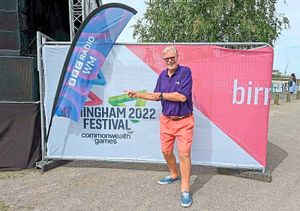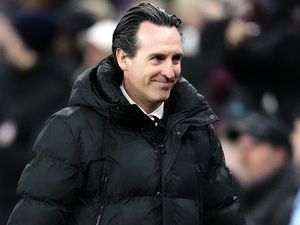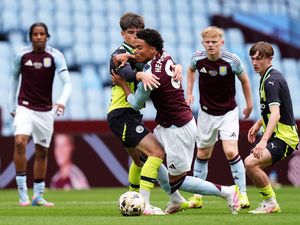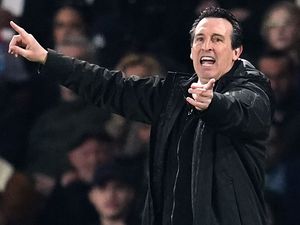'I've gorra gew!' BBC WM's Paul Franks recalls memorable moments as he hangs up the microphone
“Go on then, try and get us Elton John.”

The request from Paul Franks was partly in jest, as he sat in the BBC WM studio presenting the station’s Saturday afternoon sports coverage.
The pop legend was then chairman of Watford, and had just seen his team hit the top of the First Division table after beating West Bromwich Albion.
So yes, partly in jest, but, when it comes to football media, you just never ever know.
Tony Stephens, then a WM reporter who has since gone on to work as an agent for footballers such as David Beckham, Michael Owen and Alan Shearer, was at the other end of the line.
And, he duly delivered.
“I was in the studio, and, all of a sudden, the producer on the other side of the glass stood up and said, ‘Tony’s got Elton’,” Franks recalls.
“Elton used to wear the big platform boots in those days, and wouldn’t be able to walk from the Directors Box to the press box and our ISDN line, so Tony had to carry him, lifting him over all the seats.
“Then, all of a sudden, he was on air, and we were having a chat on BBC WM about Watford being top of the table.”
That is one of many stories and anecdotes which have deliciously infiltrated Franks’ 44-year career at the BBC. A career which, of his own volition, only has one more week to run.

Sports fans, and particularly those of Aston Villa, Wolves, West Bromwich Albion, Birmingham City and Walsall in the world of football, will remember his dulcet tones bringing them news of triumph and despair during almost four-and-a-half decades of reporting, commentating and presenting.
But his duties were also equally shared across news and current affairs with considerable time spent presenting WM’s Breakfast Show and then, for the last 21 years, accompanying many a journey home from work on Drive Time.
So, whilst that Elton John interview took place in the football arena, Franks has crossed swords, pleasantly or otherwise, with many other seismic figures from public life.
There was an interview with Rod Stewart at the Dorchester hotel – “I’ve never seen carpets so thick” – another with film legend Michael Caine, whilst he has also covered several general elections and verbally sparred with several Prime Ministers.
“With some Prime Ministers they had charisma and you could see how they reached that position – with others I’m not so sure,” he reflects.
Mention no names. He is still at the politically neutral BBC after all. But, on reflection, his extensive brushes with the celebrity world were largely positive.
“A lot of the big rock and pop stars I have been fortunate to interview have all been very intelligent and actually quite normal and humble,” he reflects.
“Often, the more famous they are, the nicer they are, and are really good company to talk to and interview.”
The generally easygoing and conversational interview technique developed by Franks – coupled with the ability to drop in the difficult questions when necessary – has all been either self-taught or learnt with experience.
He has never received any formal training, and baulks at the suggestion that should be called a ‘journalist’.
And that’s perhaps due not just to entry routes into the profession now being very different from the early 1980s, but also the fact Franks landed his first role within BBC WM – by winning a competition!
The Birmingham Mail newspaper invited prospective broadcasters in to commentate on a re-run of the Nottingham Forest/Malmo 1979 European Cup Final, a memory made even more touching following this week’s sad passing of matchwinner Trevor Francis.
Franks, born in Sutton Coldfield and brought up in Erdington, won the competition for the Over-18 age group, whilst the Under-18s honours went to Rob Hawthorne, who has since progressed to the top end of television commentary with Sky Sports.
“The competition was perfect for me, because I’d always been interested in football, and, as a kid, would sit in front of the television and commentate into my own tape recorder,” says Franks.
“It was always my dream and ambition to get into radio, and then it happened.”
It was a fairly lively first few years as a WM commentator, starting with Birmingham City clinching promotion to the First Division in 1979/80, Wolves winning the League Cup, Aston Villa the league and then the European Cup, the latter of which saw the young Franks presenting from the studio with David Wigley on the microphone in Rotterdam.
“To be presenting on the night a West Midlands club won the European Cup – which I’m not sure will ever happen again – was something else,” Franks recalls.
During his early years with the station Franks lived a dual existence, dovetailing evening sports show presenting and weekend commentaries with what his parents termed a ‘proper job', working ‘9 to 5’ in the corporate motor trade for the likes of Peugeot, Ford and Renault.
It was in 1996 that WM’s Station Manager David Robey decided that Franks’ role needed extending to become full-time hours, and the aspiring broadcaster needed little encouragement to ‘throw my hat into the ring with radio’ at the expense of a more ‘conventional career’ elsewhere.
It certainly proved an astute decision, on both sides.
And that was especially true during the years before the internet and Sky Sports, when football and sports fans who weren’t at a match were reliant on updates via terrestrial television, goal alerts on Ceefax or Teletext, or local and national radio.
Franks fronted WM’s matchday coverage when pretty much all games were played on a Saturday afternoon, and it became essential listening across the Midlands with fans glued to their transistors to follow their team’s fortunes.
That included the iconic goal horn, first introduced by Radio Birmingham presenter Stuart Roper in the 1970s, a sound still going today which signals a goal alert and, within seconds, inspires such joy – or despair – among the partisan audience.
Coverage was fast-paced and frenetic, Franks metaphorically darting effortlessly around the country to check in with reporters for updates, and always displaying a calm and composed hand – albeit sometimes excitable - at the tiller.
“It was like what people know now as Soccer Saturday, but for radio,” is his description.
“And all at a time when local radio was absolutely at its peak in terms of audience numbers.
“When you are presenting a show like that, you have to have your wits about you.





